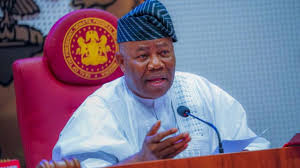Senate President Godswill Akpabio has joined other key stakeholders to call on African countries to stop the practice of exporting raw materials without adding value. They said Africa must move away from the old system of sending out unprocessed natural resources and instead focus on manufacturing, industrialisation, and local production.
This call was made during the first Raw Materials Summit held in Abuja. The event had the theme, “Shaping the Future of Africa’s Resource Landscape.” Senator Akpabio, who was represented by Senator Aminu Abbas, the Chairman of the Senate Committee on Science and Technology, said Africa needs to embrace value addition, innovation, and local production if it wants to grow its economy and create jobs.
He said the current system, where African countries export crude oil, cocoa, minerals, and other raw resources, only to buy them back as finished products, is not helping the continent. He described the model as outdated and a leftover from colonial times that still keeps African countries poor.
Senator Akpabio explained that this pattern has stopped Africa from developing strong industries and made the continent over-dependent on foreign goods. He said the Nigerian Senate is working to change this by passing new laws that will support local industries and promote economic independence.
He spoke about a new bill that is being considered at the National Assembly. The bill, called the 30% Minimum Value-Addition Bill, will make it mandatory for any raw material from Nigeria to go through at least 30% processing or transformation before it is exported. This means that raw materials will need to be refined, packaged, or processed locally before they can leave the country.
According to Akpabio, the bill is not meant to block trade but to support local businesses, create jobs, attract investors, and make sure Nigerians benefit more from the country’s natural wealth. He added that this is part of a larger effort to build a stronger and more independent economy for Africa.
He said African countries must now invest in local processing plants, support small and medium businesses, and create industries that can turn minerals and agricultural products into goods that can be sold both locally and internationally.
Senator Akpabio also called on African pension funds, development banks, and foreign investors to put money into processing infrastructure, industrial parks, and clean energy projects. He said Africa must stop depending on raw exports and focus on building strong value chains that will benefit future generations.
In his own speech, the Minister of Innovation, Science and Technology, Chief Geoffrey Nnaji, said Africa has spent too many years exporting raw potential and buying back dependency. He said it is time to change that story and make Africa a continent that adds value to its resources.
He explained that the ministry is now using digital tools, technology, and traceability systems to link research to industry. He also said that under the African Continental Free Trade Area (AfCFTA), African countries have a big opportunity to trade more with each other using locally processed goods.
Chief Nnaji said, “This is how Africa moves from extraction to transformation, from potential to prosperity. Our minerals will power industries, our crops will feed the world, and our young people will lead in innovation.”
Also present at the summit was the Director-General of the Raw Materials Research and Development Council (RMRDC), Professor Nnanyelugo Ike-Muonso. He said the time has come for African countries to take control of their resources. He encouraged countries to develop homegrown industries and stop relying on foreign technology and products.
Professor Ike-Muonso said Africa’s future depends on how the continent uses its resources. He called for more support for innovation, local manufacturing, and industrial growth across the region.
The summit brought together experts, lawmakers, government officials, and private sector leaders to discuss how Africa can use its natural wealth to build stronger economies and reduce dependence on foreign goods.
